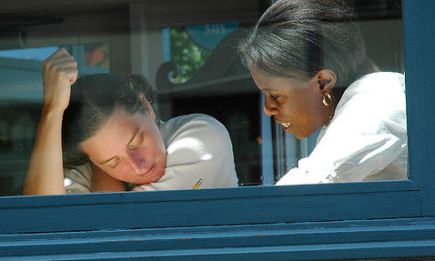What makes a good mentor?

Rhodes is visiting Stenden UAS at Leeuwarden in the Netherlands for the launch of the ‘European Center for Evidence-based Mentoring’ that will study the effects of mentoring programmes in Europe. In Boston Rhodes is the director of its American match. “In the United States there was this tendency to say that everyone can be a mentor. We would lower the demands in order to scale up our programmes as fast as possible.”
Extensive research Rhodes and her students did over the last years, however show this is not the case. “Mentoring sometimes work. That’s why I like the European focus on quality and fidelity. If the conditions are not right, mentoring has a stubbornly small effect.”
Not for everyone
According to Rhodes we have to acknowledge that being a mentor ánd a mentee is not for everyone. “To be a mentee, you have to have at least some level of competence to form a connection, while as a mentor it is important you don’t go in to a working relationship with some biases. You also have to be sensitive to socioeconomic or cultural influences.” To let a mentoring programme succeed some kind of structure is furthermore needed, Rhodes showed in Leeuwarden. “Programmes have to be flexible yet structured and focused on the young person’s interest.” Also, a mentee needs to be sure he can count on his mentor’s consistency.
Speaking with ScienceGuide, Jean Rhodes – who will probably become a visiting professor at the new European research center – praised the effort made there at Stenden to bring European professionals in mentoring together to come to a better understanding of the subject. “For the United States this is also very important. We can bridge the gap, as we are now publishing in different journals, it is basically a different currency. We can bring that together now.”
Quality before growth
To achieve sustainability in mentoring programmes “quality has to be put before growth and rigorous evaluation is a necessity. The United States and Europe should work together to achieve that. “What matters most is a shared interest and a close connection.”
Rhodes is welcoming two students from Friesland in September which will help her in her research and there’s more to come in the future. The professor hopes that students from Boston will go the other direction as well, in order to firmly establish the connection. “Having that kind of exchange would be invaluable.”
Meest Gelezen
Vrouwen houden universiteit draaiende, maar krijgen daarvoor geen waardering
Wederom intimidatie van journalisten door universiteit, nu in Delft
Hbo-docent wil wel rolmodel zijn, maar niet eigen moreel kompas opdringen
‘Burgerschapsonderwijs moet ook verplicht worden in hbo en wo’
Raad van State: laat taaltoets nog niet gelden voor hbo-opleidingen

